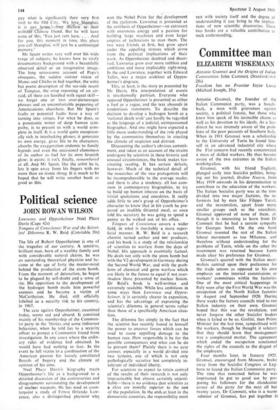Political science
JOHN ROWAN WILSON
Lawrence and Oppenheimer Nuel Pharr Davis (Cape 42s) Tongues of Conscience: War and the Scient- ist.? Dilemma R. W. Reid (Constable 50s)
The life of Robert Oppenheimer is one of the tragedies of our century. A sensitive, brilliant man, born of a wealthy family and with considerable natural charm, he was an outstanding theoretical physicist and be- came at the age of forty the master-mind behind the production of the atom bomb. From the moment of detonation, he began to be plagued by self-doubt and a sense of sin. His opposition to the development of the hydrogen bomb made him powerful enemies and he became a victim of McCarthyism. He died, still officially labelled as a security risk to his country, in 1967.
The case against Oppenheimer, examined today, seems sad and absurd. It consisted mainly of his membership of the Commun- ist party in the 'thirties and some indiscreet behaviour, when he told lies to a security officer to protect a Communist friend from investigation. In any court where the ordin- ary rules of evidence had obtained, he would have had nothing to fear. In the event he fell victim to a combination of the American passion for loosely constituted Boards of Inquiry and the climate of opinion of his time.
Nuel Pharr Davis's biography treats Oppenheimer's life as a background to a detailed discussion of the controversies and disagreements surrounding the development of nuclear weapons. He has used as coun- terpoint a study of Ernest Orlando Law- rence, also a distinguished physicist who won the Nobel Prize for the development of the cyclotron. Lawrence is presented as the antithesis of Oppenheimer—an extrovert with enormous energy and a passion for building large machines and even larger empires of technicians to man them. The two were friends at first, but grew apart under the appalling stresses which arose from the political implications of their work. As Oppenheimer doubted and theor- ised, Lawrence grew ever more ruthless and ambitious and more implacably right-wing. In the end Lawrence, together with Edward Teller, was a major architect of Oppen- heimer's disgrace.
This, at least, is the story as presented by Mr Davis. His interpretation of events is unashamedly partisan. Everyone who opposed Oppenheimer is presented as either a fool or a rogue, and the text abounds in tendentious statements. To describe the decision to develop a hydrogen bomb as a `national death wish' can hardly be regarded as the language of a judicial, unimpassioned biographer. And one might have expected a little more understanding of the role played by the communists themselves in creating the climate of suspicion and distrust.
Discounting the author's obvious commit- ment, and taken as an account of the strains undergone by scientists in these historic and unusual circumstances, the book makes fas- cinating reading. It has certain defects, however. Much of the technical detail of the researches of the two protagonists will be incomprehensible to the average reader, and there is also a tendency, all too com- mon in contemporary biographies, to try to build up human interest on the basis of trivial quotations and anecdotes. It really adds little to one's grasp of Oppenheimer's character to know that in his youth he pre- pared an inedible Oriental meal, or once told his secretary he was going to spend a penny as he walked out of his office.
Tongues of Conscience covers a wider field, in what is inevitably a more super- ficial manner. R. W. Reid is a research chemist turned author and BBC producer, and his book is a study of the relationship of scientists to warfare from the days of Nobel. His approach is essentially factual. He deals not only with the atom bomb but with the V2 development in Germany during the Second World War, and with the prob- lems of chemical and germ warfare which are likely in the future to equal if not over- shadow those presented by nuclear fission. Dr Reid's book is well-written and extremely readable. While less ambitious in some ways than Lawrence and Oppen- heimer, it is certainly clearer in exposition, and has the advantage of expressing the scientist's dilemma in general terms rather than those of a specifically American situa- tion.
The dilemma lies simply in the fact that the scientist has recently found in himself the power to uncover forces which can be used to cause appalling damage to the human race. How responsible is he for the possible consequences and what can he do to prevent them? Plainly there is no easy answer, especially in a world divided into two systems, one of which is not only pathologically secretive but completely in- tolerant of individual liberty.
For scientists to expect to retain control of the results of their research is not only impracticable but almost certainly unjusti- fiable—there is no evidence that scientists as a class are morally superior to the rest of the population. In the enck at least in the democratic countries, the responsibility must
rest with society itself and the degree of understanding it can bring to the implica- tions of new scientific discoveries. These two books are a valuable contribution to such understanding,


































 Previous page
Previous page